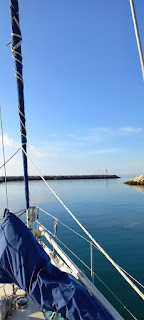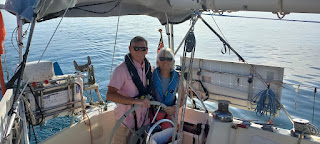Thursday morning welcomed us with the sun breaking through thin layers of mist snaking up the river banks and shrouding the higher landmarks. The forecast looked settled for the four days that it would take to sail to the Canaries. Offbeat’s crew were keen to get moving. Time to go.
Rabat is a tidal harbour and is very shallow at low tide. Boats with deep keels such as Offbeat can only leave a couple of hours either side of high tide. We presented ourselves to the police station in the marina at 0900, got the paperwork and the boat checked and, with our passports stamped, headed off down the river towards the harbour entrance at 0930. One last look at Rabat as we left (OK nine or ten last looks. It is a very beautiful place!) and then we felt the bow rise to the Atlantic swell and looked southwest towards the Canary Islands.
 |
| The winding River Bouragreg at low tide |
 |
| Plotting a route to make best use of the winds |
| Route planning to avoid ships |
 |
| Heavily reefed twin Yankee jibs |
Kirsten was our wedding present from family and friends. She’s 40 years old and I bought her second hand using money gifted when Teresa and I got married. She was a bit too stiff to work properly, and has been hanging on the back of the boat, unused and getting stiffer for five years. I spent the best part of a month stripping down almost every part of the mechanism, freeing up bearings and gears, replacing with new parts where I could and fabricating parts on the dockside where I had to. I had got everything moving much freer but this was her first test steering the boat on the open sea. Kirsten passed the test with flying colours.
Oh, and why the name Kirsten? Well, wind driven steering gear becomes a member of the crew, but consuming no electricity, food or water and steering the boat without attention for hours - days, even - without a bregak or lapse in concentration. It's traditional to name it and Teresa and I wanted to mark the incredible achievement of Kirsten Neuschäfer, a South African sailor who won the tough 2022/23 Golden Globe race.
https://goldengloberace.com/skippers/kirsten-neuschafer/
The Golden Globe is a 30,000 mile single handed round-the-world race for boats of a similar age to, or older than, Offbeat. And using technology only available at the time of the first race in 1968/69. Kirsten Neuschäfer’s victory was notable for her being the first woman to win any round the world yacht race. But what made her victory truly heroic was that during the race she rescued a fellow racer who’s boat had sunk 450 miles off the Cape of Good Hope .https://www.yachtingworld.com/news/golden-globe-skipper-rescued-by-fellow-competitor-after-24-hours-in-liferaft-141609
But with an Italian/Argentinian and a Spaniard in the crew, when the work of setting sail was finished, the conversation turned immediately to food. What were we to eat tonight? Maybe that steak? But how to prepare it? The Spanish and Italian stereotype of being obsessed with food is a trueism, and a very welcome one. Cesar produced a huge tomahawk steak with creamy mashed potato, tomatoes and mushrooms. Words cannot express how good it tasted and how hard it must be to produce in a tiny kitchen at sea. Bravo, chef!
By midnight the wind started to rise, just as forecasted on Thursday. I reefed the sails to keep control of the boat (too much sail tends to make the boat want to ‘spin off’ to one side in an uncontrollable broach. Much as a car would if you hit the accelerator on an icy road.) By the time I woke from 2 hours sleep, the sails needed reefing again. And again two hours later when the wind was a steady Force 6 and the boat flying along at 6 to 7 knots, peaking at 8 knots as the waves pushed her along.
During the early hours of Saturday the sea was rough, with a northwest swell crossing a new set of waves driven by the northeast wind. This causes a very confused sea, with crests of the two wave trains meeting and causing peaks of 3 metres. I promised Bernardo and Cesar that the waves would get into line sometime in the day and would be less uncomfortable. Around midday Sunday they did so, making life on board much more pleasant.
The average speed of the boat picked up too. With the foresails reefed down to a tiny 6 square metres from their maximum of 56 square metres, we continued to speed along at 6 to 7 knots, often riding down the front of waves at 8 to 9 knots, and the GPS recorded a maximum speed of 12 knots, beating the record of 11 knots set in similar conditions in the Bay of Biscay and off Cabo de Gata. Cesar and Bernardo adapted superbly to this challenging sailing, steering skillfully down the face of big waves. And Offbeat was built with just these sort of conditions in mind, the shape of her hull and keel, her weight and rudder all making her very seakindly.
 |
| As the waves marched past us, Offbeat simply kept on looking after us |
At 1600 on Saturday our fast progress was interrupted by a part of the sail control system breaking. I was having a sleep and Cesar called me up on deck, though the sudden loud flapping of one of the sails was waking me up already. It was obvious to me what had happened and how to fix it. Cesar and I clipped on our safety lines and went up to the foredeck to rethread a sheet into the end of its pole. 20 minutes later we were back on our way, after some great teamwork between the three of us - well, the four of us if you include Offbeat.
Thursday’s weather forecast said that the Force 6 wind would become less strong between 1700 and midnight, and was again, pleasingly accurate. By 1800 Cesar felt up to making a deliciously spicy pasta dinner and by midnight I started to let out more sail to keep our speed up. We had travelled 154 miles in the last 24 hours, compared to our average of 120 miles in 24 hours. By 0400 on Sunday we had the full 56 square metres of the two Yankee jibs out and our speed was still falling rapidly. By 0430 the wind had died to almost nothing and I conceded that we would get no further with the sails, started the motor and furled away the sails. So ended 28 hours of the most exciting sailing I have done, ever. Cesar and Bernardo reveled in it too. I’m not sure how they are going to cope with ordinary sailing after this, though.
The wind remained very light during Sunday. We stowed away the poles and the complicated system of control lines (there are 8 extra lines in use when sailing downwind with the twin Yankee jibs set on poles to hold them out). The log records 6 hours of motorsailing, using the motor to help the sails keep up a reasonable speed. Well, to be honest, we mostly were using the sails to help reduce fuel consumption of the motor as it was providing most of the power. But at least we had a visit from a pod of Dolphins to liven up the day.
At 1800 on Sunday, after the usual long discussion about what to eat and how to prepare it, and Cesar disappearing into the kitchen to work his magic, he announced that dinner was about to be served. I stopped the engine, arranged the sails to hold us comfortably in position (‘hove-to’ in nautical language), put out the table in the cockpit and Cesar produced a delightful Sunday dinner - lamb cutlets in a rich mustardy sauce, served with couscous, jamon iberico and Manchego cheese. The man is a culinary genius as well as an excellent sailor. It being Sunday, and the meal deserving proper attention and appreciation, we stayed in place for an hour, eating and chatting. The meal lacked only a glass or two of a decent red wine to make the moment perfect. But, at sea, Offbeat is a dry boat. No alcohol to cloud our minds or make us clumsy.
After an hour I broke the beautiful peace and got us under way again. We had been towing a fishing line all day and Bernardo had teased me that the meal would be made perfect if I could add a nice Tuna. Just 30 minutes after the meal, the fishing line went rigid and the reel started to clatter. I put the engine into neutral and went to set the hook but found a deadweight on the line. Then a slow, strong movement as though the fish was turning its head and the line went slack. I reeled in to find the lure gone. A 40kg ‘weak link’ that I put in the system had pulled out straight without any great effort by the fish. A pity- I would have loved to at least seen the size of it - but I don’t want to catch a fish bigger than I can eat in two meals and 40kg (80 pounds) of tuna is a lot of fish. Who knows how much bigger it was, or even if it was a shark.
 |
| Sunrise to the east of us the lights on Lanzarote to the west |
At 1000 we arrived at the entrance to Arrecife harbour and called the marina by VHF and telephone. Even after all three of us tried to persuade the marina to let us in, they said they had no room and were not going to let us come in and wait for a berth to become free.
We headed towards Puerto Calero, a couple of hours further down the coast, where a friend of mine had a boat. I had already phoned the marina, who said that they were full. I phoned Peter who advised me that if that was true, boats would be leaving during the morning, so to come in and ask when we arrived. When we were a little closer, I spotted two boats leaving Puerto Calero. ‘’Right lads, let’s get in and grab a berth’’ I said. We put on more power and were at the marina entrance at 1212. ‘’Yes, come on in, we have space’’ was the reply to our tentative radio call.
By 1230 we were tied up, grinning at each other exultantly and discussing which we would have first; a beer or a shower. My vote for a beer in the shower was turned down (the boat is a dictatorship at sea but a democracy when tied up to land). Once showered, we ate lunch in a restaurant with a decent red wine (after 10 minutes of discussion with the waitress over the varieties of fish available, how they would be cooked, what vegetables they came with, if the desserts were home made or bought in, etc. These men will not be hurried into decisions over food.) And by 1700 we were saying our goodbyes as Cesar and Bernardo had flights to catch that evening.
 |
| The marina of Puerto Calero |
The boat seemed lifeless without these two firm friends aboard and without the restless movement of the sea. But Teresa would be arriving tomorrow, the boat needed a lot of cleaning and tidying to turn it back into our home. So I went to bed and slept for 12 hours, dreaming of fast sailing, big fish, glorious sunsets and, maybe, just maybe, of food.










